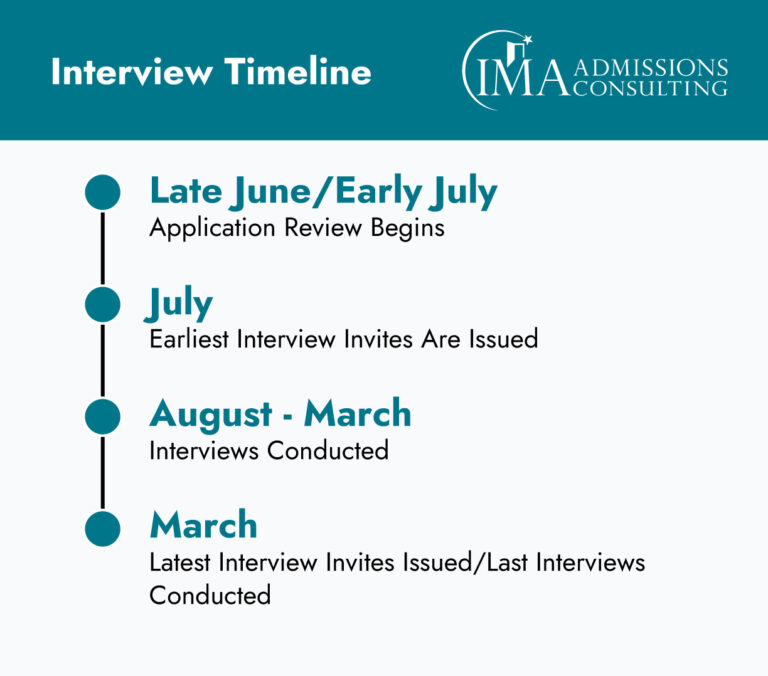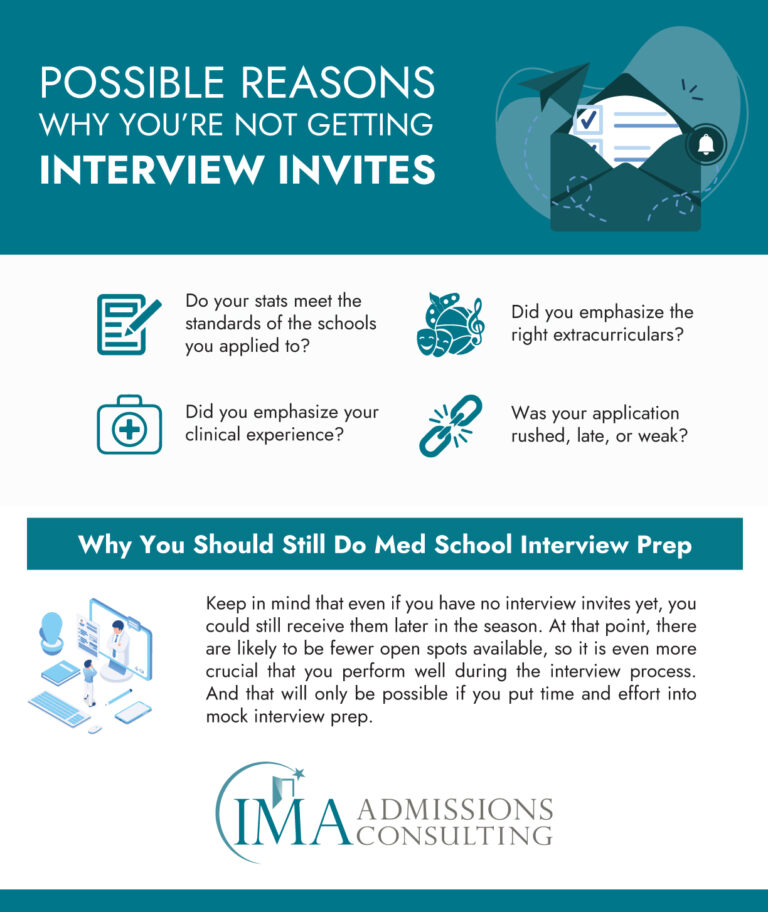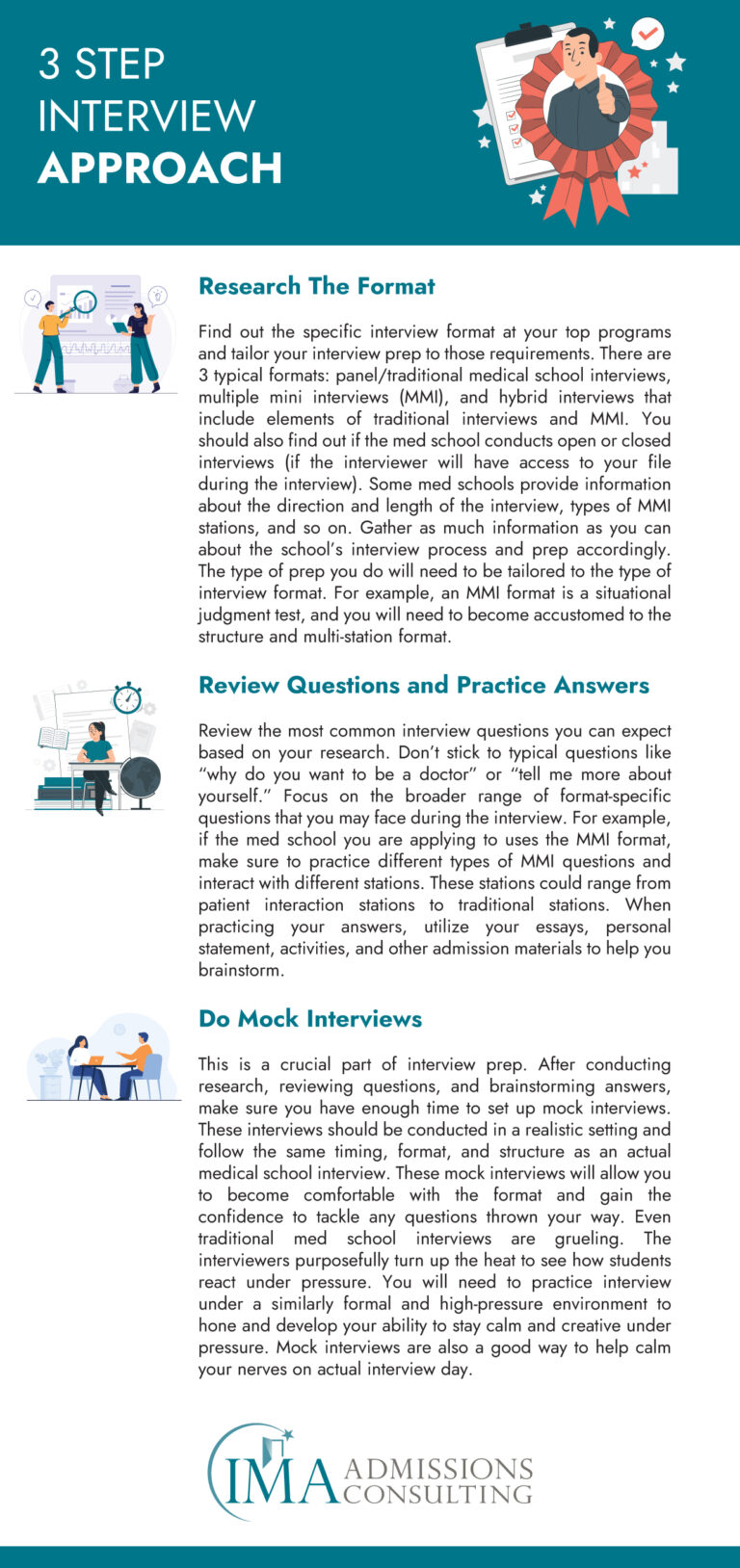When Should You Expect to Hear Back?
Trying to grasp why you have no medical school interview invites can be extremely stressful. For most students, the feeling of helplessness felt after submitting their application is their greatest source of anxiety. During the application submission period, students are busy writing their personal statements and secondary essays, so there isn’t much time for them to sit and worry. However, after applications are complete, they have a lot more free time on their hands and often spend that free time worrying.
So what should you do while waiting to hear back from medical schools? First, it is important to remember that dates for interviews vary depending on the med school. For example, programs that have rolling admissions typically have a longer interview season, with the interview season starting as early as July and ending as late as March. Check your medical school’s admissions website to confirm the dates and timeline for their interview season. We have provided a general interview timeline that follows the overall schedule that most medical schools employ.

As you can see from the timeline above, there’s an 8-month period in which medical school interviews are conducted. Please note that the timeline we’ve provided includes the overall interview period for medical schools in the United States. However, most programs in the US limit their interview season to no longer than 3 to 4 months. If a medical school starts interviews in October, they will most likely conclude interviews in January. Generally speaking, the busiest interview season is from late September to January. For those applying to programs at med schools in Canada, most programs send out all of their invites after all applications have been received because Canadian medical schools do not utilize rolling admissions. Canadian medical schools hold interviews over 1 or 2 weekends in the fall or winter months.

How do you know when it’s too late to get an interview? Again, this is something you will need to confirm with the school’s website as each program and school has a different policy. Some medical schools do not want applicants reaching out for information and instead have a set date (generally in March) by which time they have communicated a decision—rejection, waitlist, or invite to interview. Other schools may not directly communicate with each rejected applicant but will specify a certain date as the deadline for receiving invitations to interview. However, many medical schools are more vague about their admissions process, opting for a flexible approach that allows them to adapt their dates and schedules for each application season.
A general rule of thumb when it comes to medical school interview invites is no news is good news. No news might mean that the med school is still mulling over your application and you are still in the running. Even if several months have passed since you submitted your application, you could be on a pre-interview hold. A pre-interview hold is essentially like being waitlisted before the interview. Your application could still be picked up again or even issued an invitation to interview if more spots become available or you can impress the admissions committee through additional communication.
Possible Reasons Why You Aren’t Getting Interview Invites
When questioning why you are not getting invitations to interview from medical schools, the first logical line of thinking is to ask yourself, “what was wrong with my application?” It is crucial to reflect on this moving forward, but why? First, because even if you do receive invites to interview later in the season, it is important to reflect on anything in your application that may be a red flag for an admissions committee. If you do not get any invites this interview season you want to be aware of your own mistakes and not repeat these mistakes for the next application cycle. Let’s dive in to what you should consider when analyzing your application.
Did Your Stats Meet the Standards of the Medical Schools You Applied to?
While your application may have met the minimum med school requirements for the schools you applied to, that’s not always enough to secure an interview. Medical schools often receive thousands and sometimes tens of thousands of applications each year. Only the most talented and brightest students will receive an invitation to interview. You should check MSAR and the admissions website of the med school you are applying to and confirm the average accepted stats for that school. If your MCAT score and GPA are lower than the average accepted GPA and MCAT score for that medical school, this is likely a reason why you are not receiving any invites to interview. You should always check these statistics before applying. If you did not do this for the current application cycle, you should be sure to do this for the next cycle.
Did You Emphasize the Right Extracurriculars?
If your MCAT and GPA scores meet or even exceed the average scores accepted by the med schools you applied to, then the reason you aren’t getting any interview invites may be a less-than-impressive list of extracurriculars. The majority of medical schools look for certain types of extracurriculars including clinical experience, volunteer work, shadowing experience, and research activities. The extent to how much one experience type is valued over another type and how much experience is required could vary from program to program. For example, you should check how many hours of shadowing experience the schools you intend to apply to require. Some med schools may not have requirements but might recommend that a certain number of hours be completed. Other medical schools that have great research facilities and integrate mandatory research into their curriculum may rate candidates with research-related extracurriculars higher than those without. Medical schools also place an emphasis on community service and engagement, so the lack of any type of volunteer work or experience in your AMCAS Most Meaningful Experiences section might get your application waitlisted or rejected. If you are not getting any interviews despite having a seemingly robust list of extracurriculars and solid GPA and MCAT scores, it may be because your experiences and activities don’t represent you as a suitable candidate for the medical school’s program. A great way to add additional experience to your list of extracurriculars is by participating in a pre-med shadowing study abroad program. You can learn more about IMA’s healthcare internships on our website.

Did You Emphasize Your Clinical Experience?
Clinical experience is a critical extracurricular for medical schools. One of the most common reasons that students are rejected is due to their lack of clinical experience. This may simply be because you do not understand what constitutes as “clinical” experience. It is important to remember that although your shadowing hours are completed in a clinical setting, they do not count as clinical experience. Shadowing is deemed as a more passive activity and can be a useful and impressive addition to your medical school resume, but it is not a replacement for clinical experience. Volunteer hours in a medical setting that do not involve clinical work or an administrative job in a hospital also do not count towards clinical experience.
Clinical experience is crucial not only as a checklist item to boost your AMCAS Work and Activities section but also as a way to meaningfully explore one’s interest in the medical profession. Admissions committees are looking for applicants who not only have a passion for medicine but can also back up that passion with insight gained through clinical experiences. This kind of experience can also help you write a well-informed, coherent personal statement and more tailored secondary essays that reference these experiences and skills.
If you know that your application was lacking the inclusion of meaningful clinical experiences, you may want to search for additional opportunities that will allow you to gain these skills. If you do have a wealth of clinical experience on your application, reflect on if you did a good job of demonstrating this. Students often struggle with how to present their life events and experiences in their medical school application components. Reread and review your personal statement, the activities section, and your secondary essays. Do they translate the importance and significance of these experiences? Are you excited to read about them? If not, then the admissions committee likely won’t be either.
Was Your Application Late, Rushed, or Weak?
This point closely ties in with the previous one. You should reflect on whether your application was the best that it could have been. Think about if your essays appropriately demonstrated your best skills, and significant activities, and if the application in general presented a holistic view of you as a candidate. Simply listing a series of impressive clinical activities or boasting about your academic merits is not enough. Your application should tell the committee the story of your journey to medical school. They should be captivated and you should remain a memorable candidate amongst thousands of other applications.
Late applications are generally not as competitive as applications submitted on time. Naturally, if your application was late, it was likely rushed. This often hurts the quality of your application as you may not be as carefully following the instructions, answering essay prompts, or paying attention to your spelling, grammar, and punctuation. Nothing will get your application tossed out quicker than grammar issues in your essays. Even if your essay is the most compelling story possible, grammar issues and structural mistakes are not tolerated.
Why You Should Still Do Interview Prep
One of the most common mistakes that students make during the medical school application process is waiting to receive an invitation to interview before starting their interview prep. It’s natural to want to take a break after submitting a slew of essays and documents, but don’t forget that the process isn’t over yet. Instead of sitting around and worrying about the status of your application, you can spend this time prepping for the next steps.
Even if you have no interview invites, you could still receive them later in the season. By that point, there will be fewer spots available, making it more crucial that you give an amazing interview performance. Giving a good interview performance will only be possible if you put some time and effort into your medical school interview prep. Some applicants might receive invites to interview just a few weeks after submitting their applications, and while that is great, it doesn’t leave them much time to prep for the interview. The silver lining of your situation is you have plenty of time to prep and master the skills needed for the interview process. You might receive your invitation to interview less than a month before the date of the interview, and you don’t want to be in a position where you’re caught off guard with little to no time to prepare. We recommend starting your interview prep as early as possible, even if you have no interview invites yet.
Med school interviews are generally quite challenging and require students to show superior communication skills and be able to think quickly under pressure. These aren’t skills you can build up overnight. However, once you do learn these skills, they stay with you for life. Even if you do not get an invitation to interview, these skills could help land you some prestigious extracurricular experiences to brush up on your resume and can help you be prepared for the next application cycle.
How to Prepare for Interviews
Prepping for a medical school interview isn’t as easy as looking up commonly asked questions. We recommend following the 3 step approach.

If you find that you struggle to improve your communication skills, or despite adequate practice, you still feel under confident, it may be in your best interest to seek expert guidance. Medical school admissions consulting can help you identify your weaknesses and provide you with strategies for improvement.
The strategic, long-form interview prep as outlined above is not just about knowing how to answer and approach different types of questions you might be asked, it is about helping you gain communication skills and confidence.
For more information on prepping for med school interviews, check out our article on the most common medical school interview questions and for further guidance, consider IMA’s medical school admissions consulting service.
Additional Things You Can Do
Work on Gaining Additional Skills, Experiences, or Achievements
As explained above, one of the main reasons that students with impressive applications don’t get an interview invite is a lack of meaningful extracurricular experience. If you are feeling a large amount of anxiety about your application chances and can easily and clearly identify your extracurriculars as a point of weakness, focus on adding some impressive activities to your resume. The goal is to achieve a balance between being strategic and choosing activities that align with the values and vision of your top choice program, plus picking activities that appeal to your personal interests. Focus on the weakest parts of your application. If you already have plenty of meaningful research experience but not enough clinical experience, you should make an effort to gain clinical experience. If your top choice program values community service, then consider taking a volunteer job.
It is not easy to find meaningful extracurricular experiences. Positions relating to prestigious or demanding activities are often very competitive. Remember to choose to start your interview prep early, so you can ace interviews for these extracurriculars.
You can communicate your additional achievements and experiences to med schools via letters of update and letters of interest.
Submit an Update or Letter of Interest
Submitting additional communications to a medical school is a good idea, especially later on in the application season. Additional communications help your application and candidature stay fresh in the committees’ minds and allow you a means to communicate any additional achievements and experiences.
There is a difference between a letter of update and a letter of interest. An update may be a simple change or modification to your profile information and application (as far as it is permitted by the med school) and is a more informal means of communication. An update is usually focused on providing details of the updates to one’s application.
On the other hand, a letter of interest is a formal form of communication that re-affirms your interest in the medical school’s program. This letter can also include re-iteration of your unique experiences, strengths, and qualities. When writing a letter of interest, keep it succinct and focus the content on what makes you a great candidate for the school.
Which letter you choose to submit will depend on the medical school’s specific requirements. Some schools have a template or process to submit updates in place and don’t accept any other forms of communication, while others only allow updates to be sent via a letter of interest or letter of intent.
Submit a Letter of Intent
A letter of intent is a more specific letter that you would only send to one school. This confirms that the school you are communicating with is your top choice and if offered a place in their program, you would definitely accept. You should only send one letter of intent and ideally, we recommend waiting to send this out until after you have interviewed and if you are waitlisted by your top choice. If February rolls around and you still have not received any invitations to interview, you don’t have much to lose by sending out a letter of intent. Most medical schools keep an eye on their matriculation stats and would want to issue interviews and acceptances to students who are likely to accept. By reaffirming your commitment to the school, you may get the slight edge needed to get an invite to interview.
Conclusion
It is important to plan ahead and prep for the worst. What will you do if you receive no interview invites? While this can be upsetting to contemplate, keep in mind it is not necessarily the end of your dream. Use this as an opportunity to self-reflect and identify areas of weakness in your application. Think about how you can upgrade your application and consider if you need to take a gap year to help you further strengthen your application. Remember your med school selection also plays a role in your chances of acceptance. Perhaps you haven’t maximized your chances of being accepted by targeting schools where your stats will most likely get you accepted. At this stage, you can also consider hiring a medical school admission consultant to help you select the right schools and increase your chances of acceptance.
Frequently Asked Questions
When is it too late to get a medical school interview?
This depends on the timeline of the medical school you have applied to. Generally speaking, you can receive an invitation to interview as early as July and as late as March, with the busiest season being September through January.
I have a high MCAT and GPA, why haven’t I received an invitation to interview yet?
If your academic record is solid and you haven’t been invited to interview yet, you may need to reflect on your list of extracurriculars. The lack of clinical experience is one of the most common reasons students don’t receive interview invites. Additionally, you may be getting rejections because your activities don’t show a unique suitability for the programs.
How many schools should I send a letter of interest to?
You can send as many letters of interest to as many schools as you want. If you have new achievements or experiences you’d like to share, you can send a letter of interest to each med school you applied to.
Can I submit a letter of intent to multiple schools?
No, you should only submit a letter of intent to a single school. Sending out multiple letters of intent is dishonest and because admissions committees highly value integrity and honesty, we strongly discourage you from sending out more than one letter of intent.
Why am I not getting interviews?
The most common reason that students receive no interview invites for medical school is a GPA and MCAT score that is lower than the school’s accepted average. If your academic stats meet the average accepted by the schools you have applied to, review your extracurriculars to ensure you display strong clinical experience.
As an international student, will I pay more for medical school?
The answer to this question varies from institution to institution. If you attend one of the private medical schools that accept international students, your tuition fees will not be significantly different from the tuition of other students. However, if you attend a public school, your tuition cost will be much higher than that of in-state/in-province students.
Should I still do med school interview prep if I have received no interview invites?
Yes. While you may not have received any invitations to interview yet, it is still possible to receive one later in the season. Typically, you will receive an invitation less than a month before the interview takes place. Waiting until the last minute to begin your med school interview prep can prevent you from putting your best foot forward and landing a spot in the program.






